This episode of JazzOn is dedicated to a great interview with a great jazz musician, Jonathan Kreisberg, american guitarist and songwriter (New York City) with an active recording career from the mid-90’s and several albums as “leader” including the latest solo album “One” (2013); our friend Gianni Salinetti interviewed him for MusicOff and we propose, in both Italian and English language, this really interesting conversation, enjoy!MusicOff: Hi Jonathan, thank you for this interview! Let’s begin with your backgrounds, what kind of musical influences have you heard before approaching to Jazz? And after then, who were the Jazz musicians you heard, loved and studied mostly?Jonathan Kreisberg: My father had an amazing record collection, so I heard everything from Rock to Classical to Jazz. I started playing guitar when I was 10 after I heard Eddie Van Halen’s “Eruption”. I was learning mostly Rock and Classical, but I was immediately attracted to the creative aspects of improvising and composing. Although I do love listening to great Classical composers, I often just hear them as extensions of the Jazz mind. As the great saxophonist Wayne Shorter said “composing is Improvisation slowed down, and Improvisation is Composing sped up“. My biggest influences in the Jazz world were (and are) probably John Coltrane, Keith Jarrett, Miles Davis, Charlie Parker, Lennie Tristano, Allan Holdsworth, Pat Metheny and many more!!MO: Your musical language has a very articulated rhythmic component. Your compositions and improvisations are often based on polyrhythms, compound and odd meters but this high level of complexity is always crafted in a flowing and elegant way. What advice would you give to musicians aiming to improve their rhythmic vocabulary? What do you think about rhythmic teaching methods like “Takadimi”? Could it be helpful to improve these kind of skills?JK: At the core, my rhythmic vocabulary is mostly a combination of american groove concepts with other cultural and mathematical ideas applied. Basically, I like everything to “feel” good in a way that feels right to me based on my background. So my background in Jazz, Rock and Funk is always under everything. I love and listen to Flamenco and Classical indian music (takadimi type things), but I don’t have any studied background in those traditions. I’m coming from a more africa into american tradition of polyrhtyhm, and I’m constanly looking for new approaches and variations to that. MO: From your personal point of view, how much important is the language, in terms of traditional language? We’re talking about learning standards by heart, licks an stuff like that. Don’t you think that contemporary Jazz students are caring too much about theory and lesser about the above mentioned things?JK: Great question! Yes! Most modern music students are expecting their musical education to be like a “download” to their smartphone… “i’ll learn these scales in school, and then i’ll be a Jazz master!” haha. In reality, the theory and scales etc. is only there to guide one in the study of the language. The students need to learn the tradition and understand how it works, then they are ready to do something great.MO: Your last record, “One”, was a a beautiful and delicate work for solo guitar. You play semi-acoustic (your old ES-175, I suppose) and acoustic guitars. There are so many influences from Jazz to baroque lines inside it, along with an outstanding chordal approach. Working on chords is a beautiful and creative way to explore the guitar fingerboard and a lot of new guitarists are focusing more on this side of playing. How do you feel about it?JK: Thanks brother! It was so fun and challenging making that cd!! Of course, the pianistic side of the guitar has always called me, and I look forward to doing more in the future.MO: I have read you are working on a new record. Who are the musicians who teamed up with you for this work? Have you played original compositions?JK: Yeah! I’m very excited about this one! We recorded it last month. It’s mostly original music and will feature Kevin Hays on Piano. Will Vinson on Saxophone (and piano!), Rick Rosato, and Colin Stranahan. Should be out in October!MO: You are also a great teacher. This year, you will come back to Italy for the guitar classes of the Fara Music Summer Schools from July the 21st to July the 27th along with another great musician, Peter Bernstein. For you, what kind of experience is this? Is there a particular teaching approach you follow in these workshops?JK: If you are a student of Jazz or just a guitarist trying to get some different perspectives I strongly recommend you to come to Fara in July! Peter is one of the great “modern classic” Jazz musicians alive today! A true master of phrasing! I also humbly think that having us both there will give the students a very unique experience of different perspectives on the music.MO: Who are the most played artists in your cd player/iPod lately? Is there some great new record you just can’t stop to listen to?JK: It’s not new but Keith Jarrett’s “Fort Yawuh”, his solo on the title track is from outer space.MO: Thank you for your answers, a great hug from all the guys of the MusicOff staff and community!
MO: From your personal point of view, how much important is the language, in terms of traditional language? We’re talking about learning standards by heart, licks an stuff like that. Don’t you think that contemporary Jazz students are caring too much about theory and lesser about the above mentioned things?JK: Great question! Yes! Most modern music students are expecting their musical education to be like a “download” to their smartphone… “i’ll learn these scales in school, and then i’ll be a Jazz master!” haha. In reality, the theory and scales etc. is only there to guide one in the study of the language. The students need to learn the tradition and understand how it works, then they are ready to do something great.MO: Your last record, “One”, was a a beautiful and delicate work for solo guitar. You play semi-acoustic (your old ES-175, I suppose) and acoustic guitars. There are so many influences from Jazz to baroque lines inside it, along with an outstanding chordal approach. Working on chords is a beautiful and creative way to explore the guitar fingerboard and a lot of new guitarists are focusing more on this side of playing. How do you feel about it?JK: Thanks brother! It was so fun and challenging making that cd!! Of course, the pianistic side of the guitar has always called me, and I look forward to doing more in the future.MO: I have read you are working on a new record. Who are the musicians who teamed up with you for this work? Have you played original compositions?JK: Yeah! I’m very excited about this one! We recorded it last month. It’s mostly original music and will feature Kevin Hays on Piano. Will Vinson on Saxophone (and piano!), Rick Rosato, and Colin Stranahan. Should be out in October!MO: You are also a great teacher. This year, you will come back to Italy for the guitar classes of the Fara Music Summer Schools from July the 21st to July the 27th along with another great musician, Peter Bernstein. For you, what kind of experience is this? Is there a particular teaching approach you follow in these workshops?JK: If you are a student of Jazz or just a guitarist trying to get some different perspectives I strongly recommend you to come to Fara in July! Peter is one of the great “modern classic” Jazz musicians alive today! A true master of phrasing! I also humbly think that having us both there will give the students a very unique experience of different perspectives on the music.MO: Who are the most played artists in your cd player/iPod lately? Is there some great new record you just can’t stop to listen to?JK: It’s not new but Keith Jarrett’s “Fort Yawuh”, his solo on the title track is from outer space.MO: Thank you for your answers, a great hug from all the guys of the MusicOff staff and community!
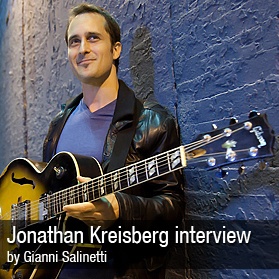
Jazz On! – Jonathan Kreisberg interview
This episode of JazzOn is dedicated to a great interview with a great jazz musician, Jonathan Kreisberg, american guitarist and songwriter (New York City) with an active recording career from the mid-90's and several albums as "leader" including the latest solo album "One" (2013); our friend Gianni Salinetti interviewe

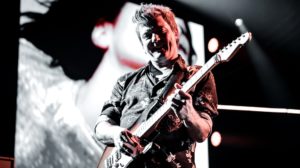
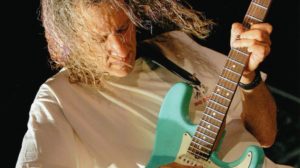
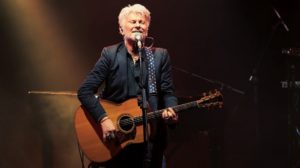
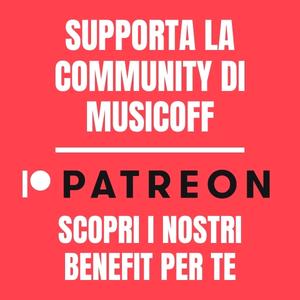






Aggiungi Commento